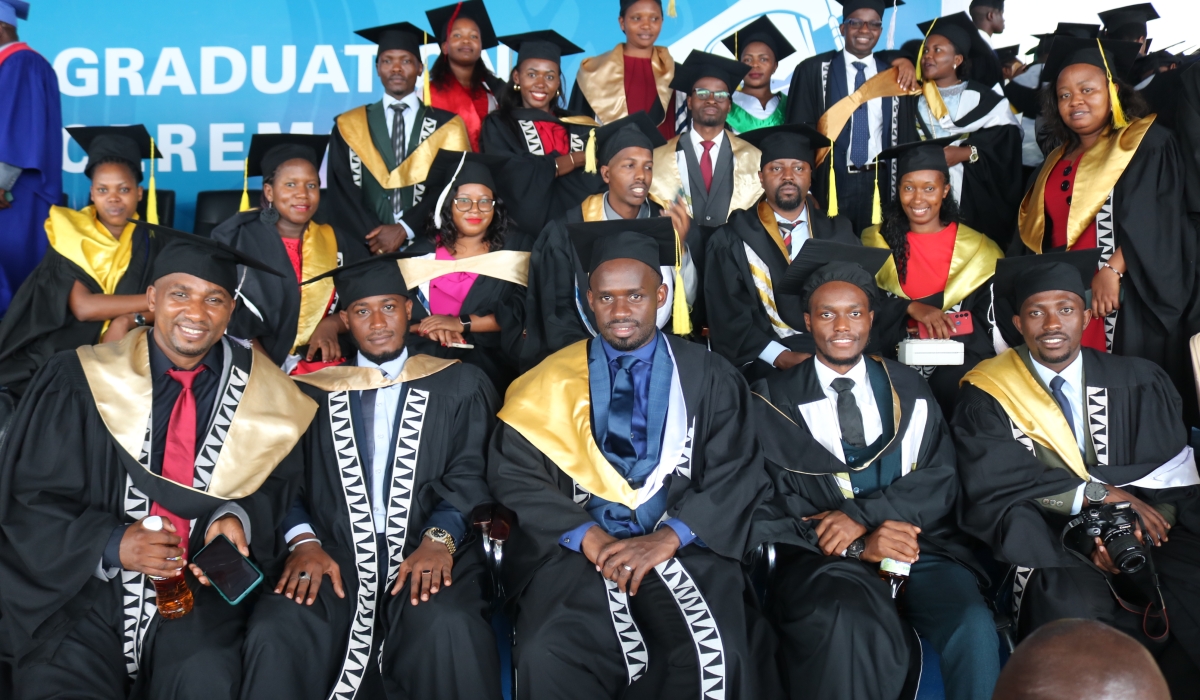UR graduation: Inside the African Centre of Excellence in Data Science
Thousands of University of Rwanda graduates, along with their friends and families, gathered on Friday, November 17, to celebrate UR's ninth graduation ceremony at Ubworoherane Stadium in Musanze District, Northern Province.
The event saw 8,321 students graduate from the UR’s six colleges; 5,063 males and 3,258 females received various degrees from diplomas to PhDs.
Out of the 8,321 graduates, 221 received diplomas, while 7,435 were conferred with advanced diplomas and Bachelor’s degrees. In addition, 627 received postgraduate certificates, diplomas, and Master’s degrees. The graduation ceremony also honoured 38 students with Doctor of Philosophy (PhD) degrees.
The African Centre of Excellence in Data Science (ACE-DS) is located at the University of Rwanda in the College of Business and Economics (CBE) and was founded on October 17, 2016. ACE-DS is part of the African Centres of Excellence project (ACE II), which is funded by the World Bank for Higher Education in Eastern and Southern Africa.
UR hosts four of these centres, aiming to promote excellence in higher education across Eastern and Southern Africa. ACE-DS trains data scientists and researchers through post-graduate training, short courses and collaborative applied research.
Among the graduates, ACE-DS had 43 at the Master’s level and 3 at the PhD level.
"Javan Juma, a Master’s graduate in Data Science from ACE-DS, emphasised the application of data science models in his thesis, specifically focusing on insurance penetration and the collaboration between insurance and microeconomic variables".
He advocated for the use of supervised machine learning models to explore new techniques that could uncover intricate relationships between these variables.
Juma recommended increased government investment in computers and ensured data availability to support students working on similar projects, emphasising collaboration with industries to enhance research capabilities.
Lindizgani Kingstone Ndove from Malawi, a graduate with a Master’s in Data Science specialising in biostatistics, created a machine-learning model to aid farmers. Her innovation allows farmers to capture images of tomato diseases on their farms and identify these diseases, offering guidance for production strategies.
“In Malawi, many farmers lack technical knowledge. This device proves invaluable by providing specific disease information, and the move aims to boost the overall farm production,” she said.
Ndove drew inspiration from her academic skills acquired from UR and observations of farming productivity in Malawi, aiming to develop something beneficial to her country and Africa as a whole.
Gaspard Twagirayezu, the Minister of Education, presided over the graduation ceremony. He congratulated the university administration, graduates’ families and friends for their unwavering commitment and remarkable achievements.
He said: “Today we are celebrating your commitment to education and pursuit of knowledge. Your success is a reflection not only of your individual efforts but also of the collective dedication of your professors, mentors and the entire academic community.
“The UR’s 9th graduation is a good opportunity to reflect on the progress made over a decade. It has grown, increased its Centres of Excellence, expanded its partners and collaborators and overall contributions to the research eco-system.
“The graduation of 38 PhDs we just witnessed and a growing number of international students are just examples we can cite today.
“As we step into the next decade, the evolution of technology, the dynamics of globalisation and shifting social economic landscapes, we demand a fundamental thinking of the role universities play in shaping our society.”
Twagirayezu emphasised that “UR stands at a critical juncture where adaptation, innovation and forward-thinking strategies are imperative. The government will keep supporting the university’s efforts to put in place forward-looking management structures, relevant programmes, designs and sustainable funding mechanisms to improve services to students and alumni.”
“I encourage you [graduates] to reflect on the values that have guided you through your academic journey. Resilience, curiosity and thirst for knowledge. These qualities should continue to serve you well on your respective path whether in the career or further academic pursuit,” he said.
The College of Education (CE) boasted the highest number of 3,591 graduates receiving their degrees, followed by the College of Medicine and Health Sciences (CMHS) with 1,361. The College of Science and Technology came third with 1,323 graduate students, while 1,080 are from the College of Business and Economics (CBE). The College of Agriculture, Animal Sciences and Veterinary Medicine and the College of Arts and Social Sciences (CASS) had 550 and 416, respectively.
The graduation also saw the awarding of degrees to 127 international students from 20 nationalities; Cameroon, Eritrea, Ethiopia, Kenya, Nigeria, South Sudan, Sudan, Tanzania, Democratic Republic of Congo (DRC), Malawi, Burundi, China, Mali, Namibia, Peru, Sierra Leone, Somalia, Uganda, Zambia and Zimbabwe.
- Log in to post comments



